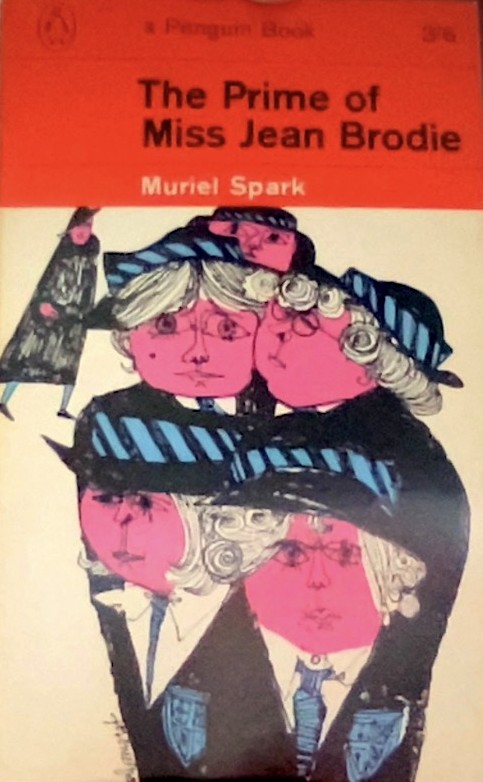Inspiring Older Readers
 posted on 14 Dec 2022
posted on 14 Dec 2022
The Prime of Miss Jean Brodie by Muriel Spark
I thought I had reread Muriel Spark’s 1961 novel The Prime of Miss Jean Brodie relatively recently, but this can’t be the case: it is so profoundly different to the version I thought I had remembered quite well.
Many will be familiar with Miss Brodie not from the book but from Maggie Smith’s iconic performance in the 1969 film adaptation. Even if you have never seen the film, at some point you will have heard Maggie Smith’s cut-glass Morningside accent saying, ‘Give me a gel at an impressionable age and she is mine for life.’ I think that this primarily is what I had in mind, and as a consequence I had reduced the novel to a ‘school story’ consisting of a series of comic set-pieces. It is much more than this.
The novel opens in 1930 and concerns a teacher at the privately endowed Marcia Blaine School in Edinburgh, where junior classes of girls are taught by the formidable Miss Jean Brodie, a woman ‘in her prime’ — she is about forty at this point — as she points out to everyone. The story revolves around Miss Brodie and the six girls who make up her favoured ‘set’ — her acolytes, her disciples, one might almost say her cult members.
Miss Brodie is a woman of advanced ideas, constantly at war with the school authorities for her maverick teaching methods, her disregard of the dull and boring curriculum, and her increasingly outrageous (for 1930s Edinburgh, anyway) extracurricular activities — entertaining ‘her girls’ to tea, paying for trips to the theatre and ballet, and the numerous visits to art galleries. Culture — a cultivated, civilised, European appreciation of the arts and humanities — is Miss Brodie’s passion.
But as with most Spark, nothing is black and white and moral questions especially are the grey areas in which her satire and wit and probing intelligence thrive. For Miss Brodie is also an admirer of both Mussolini and Hitler, and she uses her summer holidays to seek out not just sun, culture and romance but also evidence of the wonders of social progress being achieved by Mussolini in Italy and Hitler in Germany. She pins pictures of Mussolini’s marching blackshirts and Hitler’s brownshirts on the classroom wall, considering the blackshirts perhaps slightly the more glamorous but Hitler’s brownshirts ‘more dependable’. There is, then, as with much of Spark, a distinctly sinister undercurrent flowing beneath the elegant, perfectly timed wit. It is fun, but it is serious fun (rather like a lesson with Miss Brodie, perhaps).
I won’t give too much of the story away because part of the pleasure of this novel is finding out whether Miss Brodie will survive Scottish Calvinism, repressive educational institutions, suspicious parents, narrow-mindedness and sexual scandal.
There is no voice quite like Muriel Spark’s in her prime and in the character of Miss Brodie it finds its fullest expression. You are in the presence of a formidable if enigmatic intelligence. It may all look effortless, but what Spark achieves — again, rather like Miss Brodie herself — requires immense effort, steely determination and an iron will, qualities that Spark exemplified throughout her life, as Alan Taylor’s lovely memoir of his friendship with her makes clear (Letterpress review).
Many regard The Prime of Miss Jean Brodie as Spark’s masterpiece and yet again rereading reveals a much more complex and sophisticated book than I had remembered. It is certainly one of her finest and most fully accomplished novels, its wit and humour, its formal elegance, and its complex ideas all held together in a careful and coherent balance. Here, her irrepressible wit is centre-stage, the characters vivid and warmly human and there is nothing of the rather remote and icy abstraction that came to dominate some of Spark’s late novels.
The Prime of Miss Jean Brodie was published by Macmillan in hardback in 1961. The copy shown here is the first Penguin paperback edition published in 1965. Paperback publishing obviously moved at a more leisurely pace in the 1960s. The wonderful cover drawing is by Terence Greer. This copy has survived for nearly sixty years and yet looks almost as fresh as the day it was first put on the shelf in some long disappeared Penguin Bookshop. Another example of why we still love old Penguin books.
Alun Severn
December 2022